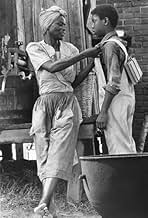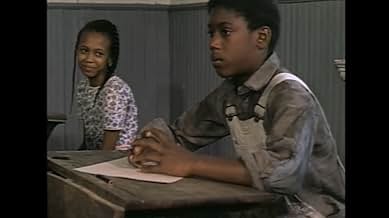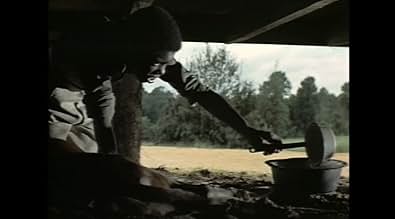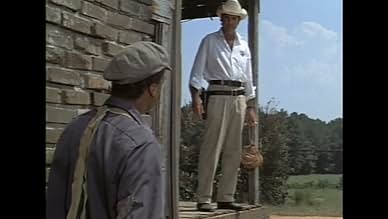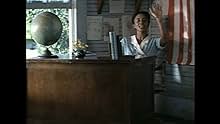Aggiungi una trama nella tua linguaThe oldest son of a loving and strong family of black sharecroppers comes of age in the Depression-era South after his father is imprisoned for stealing food.The oldest son of a loving and strong family of black sharecroppers comes of age in the Depression-era South after his father is imprisoned for stealing food.The oldest son of a loving and strong family of black sharecroppers comes of age in the Depression-era South after his father is imprisoned for stealing food.
- Regia
- Sceneggiatura
- Star
- Candidato a 4 Oscar
- 5 vittorie e 12 candidature totali
- Harriet
- (as Sylvia 'Kuumba' Williams)
- Mr. Perkins
- (as Ted Airhart)
- Teacher
- (as Merle Sharkey)
- Judge
- (as Judge William Thomas Bennett)
- Pastor
- (as Reverend Thomas N. Phillips)
Recensioni in evidenza
The intimidating malevolence of the white ruling class is felt in cruel ways, such as shooting at a dog(?!) and not telling the family where their father has been sent after he steals some food ala Jean Valjean. It's also felt in ways that are silently menacing, such as facing stern, judgmental eyes as they constantly struggle to make ends meet because of the unfair sharecropping agreement, and when the boy simply glances at a giant house while on a walk far from his own home, one of my favorite moments in the film. The other is when a couple of different teachers give him books to read, the only shred of a hope to rise in socioeconomic class. I only wish the film had a little more edge to it, which apparently the book does.
Quote: Ike (recounting a time when he accidentally went into a white church): "...I went home and did me some praying to the Lord. I said, Lord, I went into this white church down in Row (County) and all I want you to tell me is how I ever got outta there in one piece." Nathan Lee: "What did the Lord tell you, Ike?" Ike: "He said, I don't know, Ike - you doin' better'n me, I been tryin' to get in there for 200 years and ain't make it yet!"
Quiet, slow but ultimately very moving tale of a poor black family in the 1930s. There's some beautiful shots here (it was shot on location in Louisiana) and very little dialogue and only occasional music. I must admit I was getting a little bored at first--I wanted the story to MOVE! But the film slowly grew on me and, after half an hour, I was hooked. The images tell the story along with some very moving Oscar-nominated performances by Winfield and Cicely Tyson (as his wife). Even young Hooks (who was only 14 when this was done) is quite good. The film slowly works on you and, by the end, I was crying my eyes out--But don't worry--it DOES have a very happy ending.
This was a HUGE hit in 1972. It was one of the few G-rated films dealing with a black family. Unlike most other 1970s black films it had no drugs, violence, sex or swearing--this was a true rarity back then. And white, black, young and old audiences loved it. It works on all levels. It was also nominated for Best Picture. It didn't win anything but the fact that it was nominated was enough. The cast went through hell making it. I remember, in an interview, Winfield said it was brutally hot during the whole shot, the cast was eaten alive by mosquitoes and he caught a TERRIBLE case of hay fever from all the pollen. It's to this whole casts credit that they all give out good performances. Sadly...this film has been forgotten. That's too bad...it should be rediscovered.
There was a sequel 3 years later (with a different cast). It was "Sounder Part 2" but it seems nobody has ever seen it. But don't miss this one. A perfect family film.
Lo sapevi?
- QuizCicely Tyson is 15 years older than Paul Winfield.
- BlooperJames Best as the Sheriff wears sideburns that, while characteristic for 1972, when the film was made, are definitely out of fashion for 1933, when it is set.
- Citazioni
David Lee: Miss Johnson? Don't you teach in your school about folk who ain't dead?
Camille: Sure! Here's one about a man who's very much alive. Dr. William E.B. DuBois.
David Lee: What does he talk about?
Camille: Here, I'll read something he said:
[reading from "Of the Training of Black Men"]
Camille: "The longing of black men must have respect."
[pauses to explain to David Lee]
Camille: Which means a man and a woman are human and must be treated that way.
[continues reading]
Camille: "The rich and bitter depth of their experience, the unknown treasures of their inner life, the strange rendings of nature they have seen, may give the world new points of view and make their loving, living, and doing precious to all human hearts. And to themselves in these days that try their souls, the chance to soar in the dim blue air above smoke is to their finer spirits boon and guerdon for what they lose on earth by being black."
David Lee: You're a nice lady, Miss Johnson.
- Curiosità sui creditiThe 20th Century Fox fanfare doesn't play during the opening.
- ConnessioniFeatured in Sneak Previews: The Life and Death of the Black Movie (1981)
- Colonne sonoreNeeded Time (Theme from Sounder)
Written by Taj Mahal
Performed by Lightnin Hopkins
Courtesy of Kent Records and special thanks to John Williams
I più visti
Dettagli
Botteghino
- Lordo Stati Uniti e Canada
- 3.100.601 USD
- Tempo di esecuzione1 ora 45 minuti
- Colore
- Proporzioni
- 2.39 : 1
Contribuisci a questa pagina



